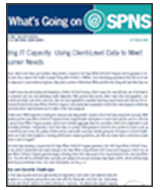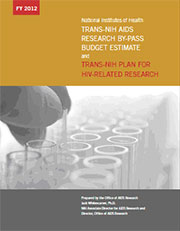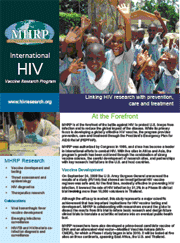Research
Federal Agencies Involved in HIV/AIDS Research
Within the U.S. government, responsibility for HIV research primarily rests with the National Institutes of Health (NIH) and is carried out in laboratories and clinics on the NIH campus in Bethesda, Maryland, and through a vast network of supported research at universities, medical centers, and clinical trial sites around the globe. But, the Centers for Disease Control and Prevention (CDC), Department of Defense, Department of Veterans Affairs (VA), Health Resources and Services Administration (HRSA), and USAID also support important HIV/AIDS research initiatives. This page provided brief profiles of the Federal agencies involved in HIV/AIDS research and links users to more detailed information.
National Institutes of Health
 The National Institutes of Health (NIH), the nation's medical research agency, includes 27 Institutes and Centers and is a component of the U.S. Department of Health and Human Services. NIH is the primary federal agency conducting and supporting basic, clinical, and translational medical research, and is investigating the causes, treatments, and cures for both common and rare diseases. NIH is the single largest public funder of HIV/AIDS research in the world. NIH’s HIV/AIDS research transcends every area of clinical medicine and basic scientific investigation, crossing the boundaries of nearly every Institute and Center (IC). NIH-supported scientists have been central to the investigation of the HIV disease process, the development of new therapies for HIV/AIDS, and the design and validation of methods of HIV prevention.
The National Institutes of Health (NIH), the nation's medical research agency, includes 27 Institutes and Centers and is a component of the U.S. Department of Health and Human Services. NIH is the primary federal agency conducting and supporting basic, clinical, and translational medical research, and is investigating the causes, treatments, and cures for both common and rare diseases. NIH is the single largest public funder of HIV/AIDS research in the world. NIH’s HIV/AIDS research transcends every area of clinical medicine and basic scientific investigation, crossing the boundaries of nearly every Institute and Center (IC). NIH-supported scientists have been central to the investigation of the HIV disease process, the development of new therapies for HIV/AIDS, and the design and validation of methods of HIV prevention.
Read about NIH’s 30 Years of AIDS Research
Read the FY2012 Trans-NIH AIDS Research By-Pass Budget Estimate and Trans-NIH Plan for HIV-Related Research
Office of AIDS Research (OAR)
The coordination of the diverse research portfolio demands an exceptional level of scientific coordination and management of research funds to identify the highest priority areas of scientific opportunity, enhance collaboration, minimize duplication, and ensure that precious research dollars are invested effectively and efficiently. These are the responsibilities of the NIH Office of AIDS Research. Located within the Office of the Director of NIH, OAR is responsible for the scientific, budgetary, legislative, and policy elements of the NIH’s HIV/AIDS-related research programs. Through the trans-NIH planning, budgeting, and portfolio assessment processes it administers, OAR is enhancing collaboration and ensuring that research dollars are invested in the highest priority areas of scientific opportunity that will lead to new tools in the global fight against AIDS. Read more about OAR.
NIH’s HIV/AIDS research spans many of its 27 Institutes and Centers, including:
National Institute of Allergy and Infectious Diseases
The National Institute of Allergy and Infectious Diseases (NIAID) conducts and supports research to better understand, treat, and ultimately prevent infectious, immunologic, and allergic diseases. Read about NIAID’s HIV/AIDS research program.
NIAID’s Division of Acquired Immunodeficiency Syndrome was formed to develop and implement the national research agenda to address the HIV/AIDS epidemic. The division works to ensure an end to the HIV/AIDS epidemic by increasing basic scientific knowledge of the pathogenesis and transmission of HIV, supporting the development of HIV therapies for HIV infection and its complications and co-infections, and supporting the development of vaccines and other prevention strategies.
NIAID’s Dale and Betty Bumpers Vaccine Research Center conducts research that facilitates the development of effective vaccines for human disease. The primary focus of research is the development of vaccines for AIDS.
Learn more about NIAID's HIV/AIDS research.

More information on NIH’s HIV/AIDS research
AIDSinfo, a service of the U.S. Department of Health and Human Services (HHS) administered by the NIH’s National Library of Medicine, offers access to the latest, federally approved HIV/AIDS medical practice guidelines, HIV treatment and prevention clinical trials, and other research information for health care providers, researchers, people affected by HIV/AIDS, and the general public. Among its research-related information are these:
Eunice Kennedy Shriver National Institute of Child Health and Human Development (NICHD)
NICHD’s Pediatric, Adolescent, and Maternal AIDS (PAMA) Branch supports and conducts both domestic and international research on HIV infection and its complications in infants, children, adolescents, pregnant women, mothers, women of childbearing age, and the family unit as a whole. Read more about NICHD’s HIV/AIDS research.
National Cancer Institute
The National Cancer Institute (NCI) has played a major role in HIV/AIDS research since the beginning of the epidemic, when a cluster of cases of Kaposi’s sarcoma was one of the harbingers of this new disease. NCI leads a national effort to eliminate suffering and death due to cancer, including AIDS-related cancers. NCI’s Office of HIV and AIDS Malignancy supports a robust and varied research program. Download HIV/AIDS Research at the NCI: A Record of Sustained Excellence. Read more about NCI’s HIV/AIDS research.
National Eye Institute (NEI)
NEI funds the Studies of the Ocular Complication of AIDS (SOCA), which involve evaluating treatments and treatment strategies for cytomegalovirus (CMV) retinitis, a common infection in people living with AIDS. Read more about NEI’s HIV/AIDS research.
National Institute of Dental and Craniofacial Research (NIDCR)
NIDCR’s mission is to improve oral, dental, and craniofacial health through research, research training, and the dissemination of health information. NIDCR’s AIDS and Immunosuppression Program supports HIV/AIDS research to advance understanding of the mechanisms that enable or prevent HIV infection and the development of oral complications associated with AIDS and AIDS-related oral cancers. Read more about NIDCR’s HIV/AIDS research.
National Institute of Diabetes and Digestive and Kidney Diseases (NIDDK)
NIDDK conducts and supports basic and clinical research on many of the most serious diseases affecting public health. Each of the three divisions in NIDDK supports an HIV/AIDS program and encourages HIV/AIDS research. Read more about NIDDK’s HIV/AIDS research.
National Institute of General Medical Sciences (NIGMS)
NIGMS supports basic biomedical research that is the foundation for advances in disease diagnosis, treatment, and prevention. In August 2007, NIGMS and NIAID launched three research centers to deepen the biological understanding of HIV. Read more about NIGMS’ HIV/AIDS research.
National Institute of Mental Health (NIMH)
NIHM’s Office on AIDS plans, directs, coordinates, and supports research designed to develop a better understanding of the biological and behavioral causes of HIV infection. The Office also cooperates with health organizations, as well as other NIH components and Federal agencies, to identify and meet AIDS-related needs, particularly as they relate to mental health issues. Read more about NIMH’s HIV/AIDS research and visit the NIMH Division of AIDS Research.
National Institute of Neurological Disorders and Stroke (NINDS)
NINDS conducts and supports research on brain and nervous-system disorders, including research on the neurological consequences of HIV/AIDS. Read about NINDS’ HIV/AIDS research.
National Institute of Nursing Research
The key to decreasing the spread and reducing the impact of HIV is to promote healthy behaviors that prevent infection or minimize the adverse effects of treatment. Health promotion, disease prevention, symptom management, and treatment adherance are key components of the research conducted by the biobehavioral scientists supported by the National Institute of Nursing Research (NINR). Read more about NINR’s HIV/AIDS research.
National Institute on Aging
The National Institute on Aging (NIA), part of the National Institutes of Health (NIH), leads a broad scientific effort to understand the nature of aging and to extend the healthy, active years of life by providing leadership in research and programs relevant to aging and older people. NIA offers information about HIV/AIDS prevention, testing, and treatment for older people.
National Institute on Drug Abuse (NIDA)
NIDA's AIDS Research Program (ARP) provides direction and leadership for the ongoing development of an HIV/AIDS research portfolio that addresses dimensions of drug use and abuse as they relate to HIV/AIDS. Read more about NIDA’s HIV/AIDS research activities.
Centers for Disease Control and Prevention (CDC)

HIV/AIDS Prevention Research Synthesis Project
This project identifies evidence-based HIV behavioral interventions to help HIV-prevention planners and providers in the U.S. select interventions most appropriate for their communities.
 CDC is involved in many different aspects of behavioral research, diagnostic research, vaccine research, and biomedical research related to the prevention and treatment of HIV/AIDS. Read about CDC’s HIV research.
CDC is involved in many different aspects of behavioral research, diagnostic research, vaccine research, and biomedical research related to the prevention and treatment of HIV/AIDS. Read about CDC’s HIV research.
Department of Defense
 The U.S. Military HIV Research Program (MHRP) is dedicated to HIV vaccine development, prevention, disease surveillance, and care and treatment for HIV. MHRP is at the forefront of the battle against HIV to protect U.S. troops from infection and to reduce the global impact of the disease. While its primary focus is developing a globally effective HIV-1 vaccine, the program provides prevention, care and treatment through the President’s Emergency Plan for AIDS Relief (PEPFAR). Working under PEPFAR since 2004, MHRP has developed comprehensive prevention, and care and treatment programs in Kenya, Nigeria, Tanzania, and Uganda. These programs expand beyond research and are a critical complement to the vaccine research activities in these countries.
The U.S. Military HIV Research Program (MHRP) is dedicated to HIV vaccine development, prevention, disease surveillance, and care and treatment for HIV. MHRP is at the forefront of the battle against HIV to protect U.S. troops from infection and to reduce the global impact of the disease. While its primary focus is developing a globally effective HIV-1 vaccine, the program provides prevention, care and treatment through the President’s Emergency Plan for AIDS Relief (PEPFAR). Working under PEPFAR since 2004, MHRP has developed comprehensive prevention, and care and treatment programs in Kenya, Nigeria, Tanzania, and Uganda. These programs expand beyond research and are a critical complement to the vaccine research activities in these countries.
Department of Veterans Affairs
 In the United States, the Department of Veterans Affairs (VA) is the single largest provider of healthcare for HIV/AIDS, caring for approximately 23,463 HIV-infected Veterans. Investigators with VA's Health Services Research & Development Service conduct studies aimed at identifying and treating HIV—particularly via the HIV/Hepatitis Quality Enhancement Research Initiative (QUERI), whose highest priority is to identify, understand, and minimize deficiencies in the care of HIV-infected Veterans. Read more about current HIV/AIDS research at VA.
In the United States, the Department of Veterans Affairs (VA) is the single largest provider of healthcare for HIV/AIDS, caring for approximately 23,463 HIV-infected Veterans. Investigators with VA's Health Services Research & Development Service conduct studies aimed at identifying and treating HIV—particularly via the HIV/Hepatitis Quality Enhancement Research Initiative (QUERI), whose highest priority is to identify, understand, and minimize deficiencies in the care of HIV-infected Veterans. Read more about current HIV/AIDS research at VA.
Food and Drug Administration (FDA)
 FDA, part of the U.S. Department of Health and Human Services. conducts research to establish product standards and improve testing methods to assess the safety of HIV/AIDS drugs and biologics. FDA’s research programs have played a significant role in the development of vaccines, therapeutic products, and test kits. This research includes work on HIV infection and vaccine models for its prevention, and studies of the body’s immune response to HIV. Read about FDA’s HIV research activities.
FDA, part of the U.S. Department of Health and Human Services. conducts research to establish product standards and improve testing methods to assess the safety of HIV/AIDS drugs and biologics. FDA’s research programs have played a significant role in the development of vaccines, therapeutic products, and test kits. This research includes work on HIV infection and vaccine models for its prevention, and studies of the body’s immune response to HIV. Read about FDA’s HIV research activities.
Health Resources and Services Administration – HIV/AIDS Bureau

 Research on HIV/AIDS care is a focus of the Health Resources and Services Administration (HRSA), part of the U.S. Department of Health and Human Services. Under the Ryan White HIV/AIDS Program, HRSA’s HIV/AIDS Bureau supports Special Projects of National Significance (SPNS) to advance knowledge and skills in the delivery of health and support services to underserved populations diagnosed with HIV infection. SPNS grants fund innovative models of care and also support the development of effective delivery systems for HIV care. Each initiative is supported by a SPNS Evaluation and Technical Assistance Center charged with evaluation design.
Research on HIV/AIDS care is a focus of the Health Resources and Services Administration (HRSA), part of the U.S. Department of Health and Human Services. Under the Ryan White HIV/AIDS Program, HRSA’s HIV/AIDS Bureau supports Special Projects of National Significance (SPNS) to advance knowledge and skills in the delivery of health and support services to underserved populations diagnosed with HIV infection. SPNS grants fund innovative models of care and also support the development of effective delivery systems for HIV care. Each initiative is supported by a SPNS Evaluation and Technical Assistance Center charged with evaluation design.
USAID
 The U.S. Agency for International Development (USAID) supports applied research and public health evaluations to provide local implementing partners, donors, and national governments with the evidence base to improve HIV/AIDS services and inform policy. Its key HIV/AIDS research priorities include vaccine development and microbicides. The agency also supports HIV/AIDS program research and public health evaluations designed to improve coverage, quality, and effectiveness of HIV/AIDS programs in developing countries.
The U.S. Agency for International Development (USAID) supports applied research and public health evaluations to provide local implementing partners, donors, and national governments with the evidence base to improve HIV/AIDS services and inform policy. Its key HIV/AIDS research priorities include vaccine development and microbicides. The agency also supports HIV/AIDS program research and public health evaluations designed to improve coverage, quality, and effectiveness of HIV/AIDS programs in developing countries.
Read related issue briefs from USAID:
Last revised: 06/06/2012

